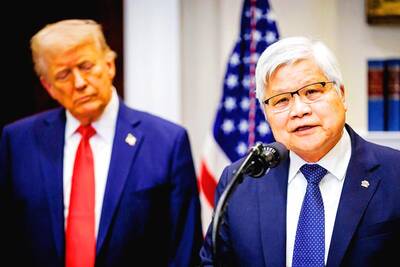The latest telephone survey conducted by National Chengchi University from March 30 to April 2 and released by the Mainland Affairs Council (MAC) shows that about 8 percent of respondents supported “maintaining the status quo and seeking unification at a later date” and 1.5 percent supported “unification at the earliest possible opportunity.”
In other words, less than 10 percent of respondents supported unification with China, suggesting that more than 90 percent of Taiwanese do not support unification.
The poll also found that nearly 30 percent of respondents said the “status quo” should be maintained in perpetuity, an increase on previous polls. In addition, 32.4 percent of respondents said that the “status quo” should be maintained with any decision on unification left to the future — the lowest level of support for that option since the poll was first commissioned by the council, suggesting that people have a clearer idea about relations with China.
The poll was conducted after former Chinese Nationalist Party (KMT) chairman Wu Poh--hsiung (吳伯雄) visited Beijing and proposed the “one country, two areas (一國兩區)” concept during a meeting with Chinese President Hu Jintao (胡錦濤).
The council occasionally conducts polls on the issues of unification and independence, which gives respondents a number of options to choose from: “maintaining the status quo and making a decision later,” -“maintaining the status quo in perpetuity,” “maintaining the status quo and declaring independence later,” “maintaining the status quo and seeking unification at a later date,” “declaring independence as soon as possible” and “seeking unification at the earliest possible opportunity.”
The poll is intended as a reference point on public opinion toward the issue of independence and unification.
In the latest poll, 32.4 percent of respondents supported “maintaining the status quo and making a decision later,” 29.9 percent chose “maintaining the status quo in perpetuity,” 15.7 percent believed that Taiwan should “maintain the -status quo and declare independence later,” 8.2 percent favored “maintaining the status quo and seeking unification at a later date” and 6.1 percent wanted to declare independence as soon as possible, while only 1.5 percent wanted to seek unification at the earliest possible opportunity.
As for the pace of cross-strait exchanges, the poll showed that 45 percent of Taiwanese think they are just right, while 32.6 percent think they are developing too quickly.
Compared with the previous poll in which 48.1 percent believed they were just right and 25.7 percent said they were too fast, the results of the latest poll suggested that Taiwanese are worrying more about the pace of cross-strait exchanges.
Although Beijing has granted economic favors to Taiwan since President Ma Ying-jeou (馬英九) took office in 2008, 49.7 percent of respondents said that the Chinese government has behaved in an unfriendly way toward the Taiwanese government, while 33 percent believe that Beijing has been friendly.
On the other hand, 45.7 percent of respondents said that the Chinese government was unfriendly to Taiwanese, while 38.5 percent said Beijing was friendly.
The survey had 1,079 samples with a margin of error of plus or minus 2.98 percentage points.

ENDEAVOR MANTA: The ship is programmed to automatically return to its designated home port and would self-destruct if seized by another party The Endeavor Manta, Taiwan’s first military-specification uncrewed surface vehicle (USV) tailor-made to operate in the Taiwan Strait in a bid to bolster the nation’s asymmetric combat capabilities made its first appearance at Kaohsiung’s Singda Harbor yesterday. Taking inspiration from Ukraine’s navy, which is using USVs to force Russia’s Black Sea fleet to take shelter within its own ports, CSBC Taiwan (台灣國際造船) established a research and development unit on USVs last year, CSBC chairman Huang Cheng-hung (黃正弘) said. With the exception of the satellite guidance system and the outboard motors — which were purchased from foreign companies that were not affiliated with Chinese-funded

PERMIT REVOKED: The influencer at a news conference said the National Immigration Agency was infringing on human rights and persecuting Chinese spouses Chinese influencer “Yaya in Taiwan” (亞亞在台灣) yesterday evening voluntarily left Taiwan, despite saying yesterday morning that she had “no intention” of leaving after her residence permit was revoked over her comments on Taiwan being “unified” with China by military force. The Ministry of the Interior yesterday had said that it could forcibly deport the influencer at midnight, but was considering taking a more flexible approach and beginning procedures this morning. The influencer, whose given name is Liu Zhenya (劉振亞), departed on a 8:45pm flight from Taipei International Airport (Songshan airport) to Fuzhou, China. Liu held a news conference at the airport at 7pm,

KAOHSIUNG CEREMONY: The contract chipmaker is planning to build 5 fabs in the southern city to gradually expand its 2-nanometer chip capacity Taiwan Semiconductor Manufacturing Co (TSMC, 台積電), the world’s biggest contract chipmaker, yesterday confirmed that it plans to hold a ceremony on March 31 to unveil a capacity expansion plan for its most advanced 2-nanometer chips in Kaohsiung, demonstrating its commitment to further investment at home. The ceremony is to be hosted by TSMC cochief operating officer Y.P. Chyn (秦永沛). It did not disclose whether Premier Cho Jung-tai (卓榮泰) and high-ranking government officials would attend the ceremony. More details are to be released next week, it said. The chipmaker’s latest move came after its announcement earlier this month of an additional US$100 billion

Authorities yesterday elaborated on the rules governing Employment Gold Cards after a US cardholder was barred from entering Taiwan for six years after working without a permit during a 2023 visit. American YouTuber LeLe Farley was barred after already being approved for an Employment Gold Card, he said in a video published on his channel on Saturday. Farley, who has more than 420,000 subscribers on his YouTube channel, was approved for his Gold Card last month, but was told at a check-in counter at the Los Angeles International Airport that he could not enter Taiwan. That was because he previously participated in two